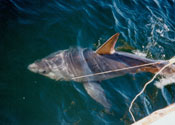U.S. government urged to help threatened sharks

Conservation groups call for Administration’s strong support for international trade limits at upcoming CITES meeting
Washington, D.C. In a letter today, seven prominent US based environmental, animal rights, and trade organizations called on the Bush Administration to support proposals to restrict international commerce in two species of threatened sharks through the Convention on International Trade in Endangered Species (CITES) and to stand firm against opposition to the US proposal to ban trade in closely related sawfish. So far, the US has been critical of the shark proposals, offered by the European Union, which aim to limit trade in spiny dogfish and porbeagle sharks to sustainable levels. The conference of the 171 member countries of CITES begins this Sunday and runs through June 15 at The Hague.
“Given US leadership in shark conservation and promotion of all other CITES action for sharks, the government’s lack of support for the EU shark proposals is particularly distressing,” said Sonja Fordham, director of the Ocean Conservancy’s Shark Conservation Program. “Like the sawfish, these vulnerable and imperiled sharks need decades to recover and their best hope lies with international cooperation.”

Spiny dogfish are exported from all corners of the globe to satisfy European demand for fish and chips and smoked belly flaps. Porbeagle meat is among the most prized in Europe while fins are sent to Asia for use in shark fin soup. Spiny dogfish and porbeagle shark populations have been seriously depleted by targeted, poorly regulated fisheries. The IUCN (World Conservation Union) classifies both species as globally Threatened and Endangered in the US Atlantic. Canada and the US still allow fishing on these shared populations and neither country has expressed support for the proposals for CITES action.
The letter details how a 2000 federal plan to rebuild dogfish has been undermined by Atlantic state action. States recently ramped up trip limits by 500%, leading to a 50% overage in the annual quota. Landings skyrocketed from 1,637,790 to 6,230,636 pounds over the last two years. Catch in Virginia increased 1000 times last year. Groups assert CITES action to limit exports to sustainable levels could improve compliance for the federal dogfish plan.
“The CITES experts agree that listing is warranted for spiny dogfish, porbeagles, and sawfish,” said Charles Fox, senior officer at the Pew Environment Group. “The US should safeguard the sharks, its sawfish proposal, and its reputation as a fish conservation champion, by actively supporting the EU proposals at the CITES conference as an important step towards improving shark status worldwide.”
The letter was signed by representatives from the Pew Environment Group, Ocean Conservancy, TRAFFIC North America, the Humane Society of the United States, Greenpeace, the Natural Resources Defense Council, and the Shark Research Institute.
Sharks and closely related skates, rays and sawfish are especially vulnerable to overfishing and slow to recover from depletion because they generally grow slowly, mature late, and produce few young. Three species of sharks – white, basking and whale – are already listed under CITES, thanks in part to US support, but the volume of trade in these species is dwarfed by that in spiny dogfish.






